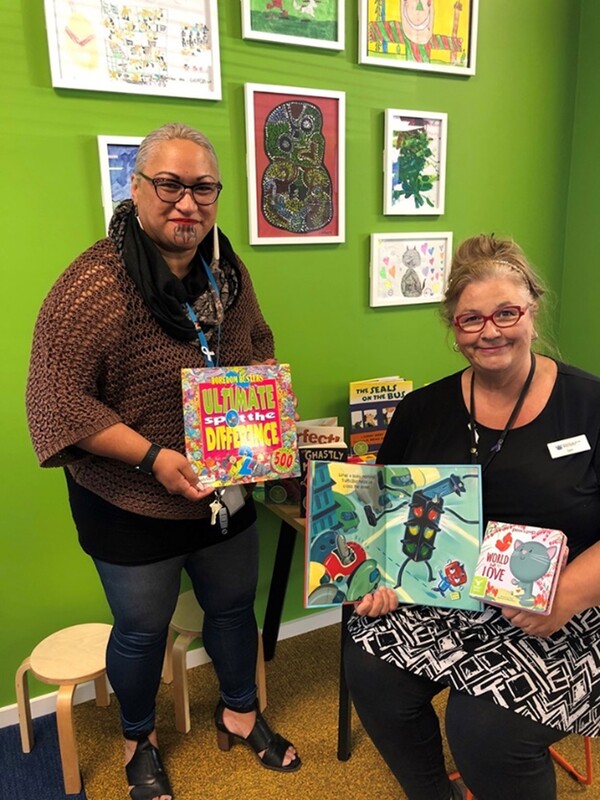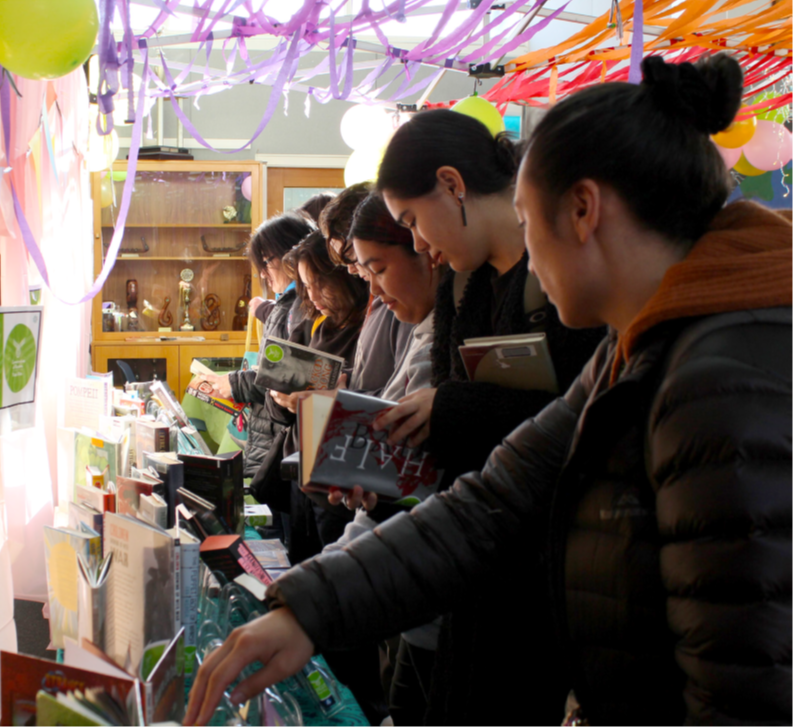Reading is both an individual passion and a social activity that can be influenced, inspired and actively enabled by others. Whānau, peers, teachers, librarians, and community have huge influence as role models and facilitators, through talking about books they have read, telling stories, sharing their own interest and joy in reading, reading aloud with their whānau of all ages, providing access to great books and being seen reading themselves.
We know there are many factors that can affect reading engagement but the more that communities surrounding tamariki and rangatahi understand their influence in creating young readers and the potential impact of reading for pleasure, the more effective they are in encouraging and supporting reading.
This is the central finding from phase 1 of the National Library’s Pūtoi Rito Communities of Readers initiative and reinforces proven good practice and research findings from across the world. While there is an extensive body of international research on the value of reading for pleasure and wellbeing, there is much less that is based within Aotearoa New Zealand settings. With this programme we are generating local research and insights and exploring how to build reading engagement effectively and sustainably in a New Zealand context.
“A love of reading can be more important for a child’s educational success than their family’s socio-economic background” (Dept Education UK, 2012, p 3 sourced from Kirsch et al, 2002, p 3).
Voluntary engagement with reading – reading for pleasure, relaxation, and enjoyment – has proven lifelong benefits. These include improving literacy, knowledge, academic attainment, and cultural understanding. Reading for pleasure provides a foundation for developing other literacy skills including digital and critical literacies, crucial for participation in today’s complex information landscape. Reading also supports identity, personal and social development, empathy, and wellbeing.
However, young people’s levels of literacy and reading for pleasure are in steady decline (Hood & Hughson, 2022; McNaughton, 2020) and as COVID constraints ease, the impact of the last two years is expected to show deepening inequities for young people. The Ministry of Education launched the Literacy and Maths Communications Strategy in March 2022 including an action focus area to consolidate a partnership with National Library Te Puna Mātauranga o Aotearoa to extend literacy engagement opportunities. Across the education and related sectors, there is increasing recognition of the role of reading for pleasure in supporting literacy development and wellbeing.
Reading – growing a nation of readers – is one of three themes in the National Library’s Turning Knowledge into Value, Strategic Directions to 2030. Alongside Pūtoi Rito, National Library and partners have established Te Awhi Rito Reading Ambassador initiative to inspire powerful and positive reading experiences for tamariki, rangatahi, whānau, and communities. Ben Brown, writer and storyteller, is the first Te Awhi Rito and a national advocate and champion for reading.
Pūtoi Rito is a series of collective impact partnership projects, led by National Library and funded by Te Puna Foundation, that aim to influence and strengthen the conditions that lead to the development of a culture of reading. Each project is in different school and community settings across Aotearoa, with local and national partners including schools, Mana Whenua, Ministry of Education, Oranga Tamariki and many others. In every project, the National Library is collaborating with public libraries and/or school libraries, working together to have the greatest impact.
In Phase One, 2019-2021, there were two projects centred in schools (with five primary schools in a Kāhui Ako in West Auckland, and with Huntly Secondary College) and two community projects (with the South Dunedin community and supporting young people in care in the Canterbury region). Research by external professional researchers was a key part of each project, and the initiative included an international and national literature review, and the development of resources, tools and frameworks for teachers and librarians to support their professional practice. Phase One has also stimulated a growing interest and further research in this area.
INSIGHTS FOR LIBRARIES
The insights from Phase One have been brought together in the Pūtoi Rito Communities of Readers Phase One Summary and Insights report, incorporating the research findings and additional feedback and reflections from partners, collaborators, and staff.
There are insights that relate directly to creating a culture of reading in schools and others that are about engaging with a wider community, such as developing community champions and making reading visible for whānau in many places outside the library and the classroom. There are some conditions, however, that encourage tamariki and rangatahi to read for pleasure in any setting and many of these are directly within the influence of libraries.
As well as the central finding about the huge importance of the community surrounding tamariki and rangatahi as role models and enablers, Pūtoi Rito Phase One demonstrated:
- The deepest engagement with stories and reading often occurs with books in home languages and ‘heart languages’. There is high demand for books that connect to place, culture and identity, particularly books in Te Reo Māori or with a Te Ao Māori context, and in the diverse languages of Aotearoa.
- Tamariki and rangatahi need choice in what they read and the freedom and support to pursue their own interests. They need opportunities to grow their understanding of others as well as themselves. They need ‘windows and mirrors’ that reflect their own identity and open doors to other worlds and possibilities.
- Books should be plentiful, high-quality, visible in many places, and easily accessible. The combination of high appeal, good quality, variety, and accessibility without barriers, leads to the books being valued and appreciated.
- Expert selection, consultation, curation, and reading suggestions based on a wide knowledge of the literature for tamariki and rangatahi, and the people in the community, are highly valued and appreciated.
- Leadership and shared purpose are required in a local context to bring communities together to create an environment where reading for pleasure is supported, celebrated, prioritised and encouraged. Engagement with reading cannot be left to chance. Libraries, as trusted places of equity and community connections, can contribute to leading and building this shared purpose.
Throughout Pūtoi Rito, we are aiming for the engagement with communities to be collaborative, generous and joyful, creating good associations with reading and encouraging a strengths-based approach.
“Wouldn’t it be wonderful to see all the adults in their lives support this ambition, with their school, homes, aunts, caregivers, whānau – all the adults in their lives – supporting a love of reading and providing access to books.” Pūtoi Rito Community Project Partner
Elizabeth Jones, Director Literacy and Learning, National Library of New Zealand Te Puna Mātauranga o Aotearoa
Kate Irvine, Programme Manager, National Reading Initiatives, National Library of New Zealand Te Puna Mātauranga o Aotearoa
REFERENCES
Hood N. & Hughson T. (2022). Now I don’t know my ABC, The perilous state of literacy in Aotearoa New Zealand. The Education Hub
McNaughton, S. (2020). The Literacy Landscape in Aotearoa New Zealand. Office of the Prime Minister’s Chief Science Advisor
Kirsch I, de Jong J, LaFontaine D, McQueen J, Mendelovits J, Monseur J (2002) Reading for Change Performance and Engagement Across Countries - Results From PISA 2000, OECD. Accessed in Research evidence on reading for pleasure, Dept of Education, UK, (2012)





 RSS Feed
RSS Feed